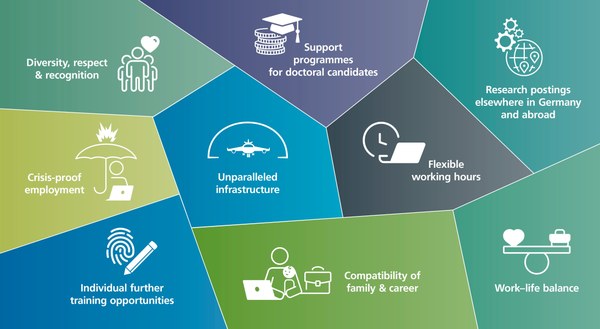Monika Mayer
Field of study: Mechatronics
Now: Institute of Structures and Design
Monika Mayer studied mechatronics and joined DLR in 2013 for her bachelor’s degree thesis. As a member of staff in the technical service department, she now works at the Department of Automation and Quality Assurance in Production Technology of the Center for Lightweight-Production-Technology (ZLP) in Augsburg, a part of the DLR Institute of Structures and Design. Here, she tells us about her work.
Monika, what do you look forward to when coming to work in the morning?
Monika: I look forward to a relaxed but hardworking atmosphere with many interesting tasks.
What are you researching or working on?
Monika: Here in Augsburg we are trying to bridge the gap between a small demonstrator and industrial production. This means that we manufacture full-size aerospace components. I work in the field of Quality Assurance (QA). We integrate innovative measurement systems into manufacturing processes and then collect and evaluate their data in a meaningful way.
Among other things, I work with a fibre angle sensor. Mounted on a robot, it measures the actual values at given points on the component and compares them with the target values from the component simulation.
„We manufacture full-size aerospace components. I work in the field of Quality Assurance.“
What does your typical working day involve?
Monika: Fortunately, a typical day does not really exist. There are phases in which I program a lot – formerly in C#, now mainly in Python, C++ and Java – or plan sequences of movements for robots using CAD. Then I alternate between tasks in our large robot hall: using measurement technology, testing software and robot programs, carrying out experiments and dealing with various initial difficulties.
Where and how is your work being used?
Monika: Some QA methods help to improve processes that are still under development, such as a high-precision laser triangulation sensor, with a number of possible applications. Firstly, there is the component measurement to obtain an image of the 3D geometry, and secondly the extraction of contours from point clouds in order to check the positioning of blanks in a 3D component form.
Other QA methods or modified and more cost-effective versions of previous ones are intended for use in industry. For example, a more conventional laser triangulation sensor, which finds gaps, overlaps or defects in a material, or a fibre angle sensor, which not only improves processes but also documents deposition accuracy and material quality.
What are the highlights of your work?
Monika: Seeing how my work contributes to the bigger picture. For example, proving the accuracy of a process through measurement results or comparing simulations with real data. Actually, whenever colleagues and their research areas benefit from my work.
„I really appreciate the fact that we support one another“
What special skills can you make good use of in your job?
Monika: I think it is a mindset, rather than a special skill that is most important. To think in an interdisciplinary manner, to want to learn something new and to not be disheartened by failures. These are the key aspects of the story and everyday life of a researcher.
Leave us a final thought.
Monika: I would like to thank all of my colleagues. I really appreciate the fact that we support one another, take the time to understand each other’s projects and provide valuable input even when working under stressful conditions or dealing with topics that we have not been involved in for a while.




